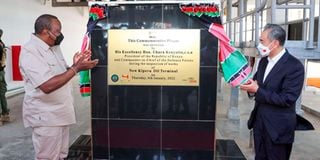The future of Kenya’s development cooperation pivots on transparency

President Uhuru Kenyatta with the State Counsellor and Minister for Foreign Affairs of the People’s Republic of China Mr Wang Yi when they unveiled a commemorative plaque during an inspection tour of the ongoing construction of the new offshore Kipevu Oil Terminal at the Port of Mombasa.
What you need to know:
- The fallout from the novel coronavirus and its increasing mutations is apparent.
- It has laid bare the gap between the industrialised North and developing South.
With millions of individuals in the global South at increased risk of falling severely ill and potentially dying from Covid-19, there is increased focus on the role of development cooperation on securing livelihoods, particularly official development assistance, or foreign aid, which is its most visible and quantifiable modality.
This virus, whose origin is shrouded in international controversy, is creating inordinate damage and suffering in developing countries where households and individuals lack access to quality, affordable and reliable healthcare. This situation is compounded by widespread unemployment and absence of social safety nets.
The fallout from the novel coronavirus and its increasing mutations is apparent. It has laid bare the gap between the industrialised North and developing South and makes the push for the timely achievement of the Sustainable Development Goals (SDGs) almost impossible. Vaccine inequality and uneven recovery between countries, along with travel bans and restrictions, are becoming a potential source of conflict in international relations.
While advanced countries have been able to leverage technology to reasonably mitigate against the most disruptive impact from measures such as social distancing, lockdowns and closures, some ill-prepared countries in the South have not been as lucky. Without a fallback plan, Uganda closed schools for two years, a steep cost that learners must bear.
The pandemic has spawned labour market imbalances, disrupted supply lines, triggered food shortages and created inflationary pressure. In the developing countries, the pandemic has not only affected learners in the form of irrecoverable time but also created serious mental and behavioural issues that range from mild anxiety to suicidality.
Growth-killing taxes
In Kenya, mental health challenges have reached crisis levels, as can be deduced from increased prevalence of suicide, domestic violence and homicide. While many of these cases will go undiagnosed, receiving therapy is simply unaffordable — even to those holding decently paying white-colour jobs.
This pandemic will keep destroying livelihoods and claiming lives. Amidst rising cost of living, there has been a steady loss of jobs and income at household levels. That translates to falling productivity and sustained loss of tax revenue.
President Uhuru Kenyatta has no choice but impose unpopular, growth-killing taxes if he is to raise revenue to service an unsustainably large sovereign debt. He is also likely to be advised — by the IMF — to deal with deficit financing by cutting back on subsidies to state enterprises and reducing social sector funding, including to healthcare and education.
Heavily taxed parents will pay even more, in form of fees. Expectedly, many learners are likely to drop out of school, bringing to a crashing end the “free universal education” utopia first articulated by President Mwai Kibaki 20 years ago. Clearly, instead of higher incomes, the global South is likely to fall further behind.
What role can international development cooperation play in at-risk countries like Kenya? There is a clear need for development partners to attach greater significance to governance and accountability — perhaps much more than they do with development finance.
Disclose financial dealings
Partners, including China, must embrace open and inclusive development cooperation forums, be willing to disclose their financial dealings with the state (no matter how embarrassing or inconvenient) and empower the public to demand accountability.
Resident ambassadors in Nairobi can help by questioning the source of fabulous wealth flaunted by duplicitous government officials and their family and associates. They must condemn normalised use of state power and resources to advance narrow, partisan and personal interests.
Kenya enjoys favourable treatment by traditional and emerging partners. Over the years, its relations have translated to unaccountable levels of concessional and non-concessional finance, ostensibly for development of projects.
It is imperative for partners to lift the lid on secretive financial arrangements, including the Eurobond, as well as contracts related to the construction and operation of the SGR, the dry port in Naivasha and the Nairobi Expressway, which the government has promoted as a game-changing PPP.
Providing more foreign aid without a proper third-party audit of the country’s debt and financial dealings would engender impunity and corruption and embolden the masters of state capture. This is an urgent cancer whose tumours the international community can help to remove.
Mr Chesoli is a New York-based development economist and global policy expert. [email protected].





